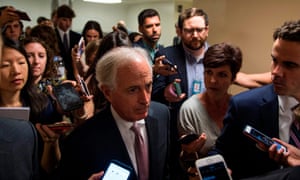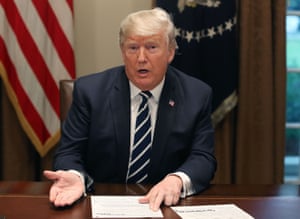President says he supports US intelligence consensus on 2016 election – but then says ‘it could be other people also’
Donald Trump sought to reverse course on Tuesday, after top
Republicans scrambled to distance themselves from his behavior in his
meeting with Vladimir Putin in Helsinki.
Even then, Trump could not resist muddying the waters further. Speaking to reporters in the Roosevelt Room of the White House, the president stated that he accepted the assessment of US intelligence agencies that Russia interfered in the 2016 US election – and then, moments later, cast doubt on who was responsible.
“Let me be totally clear in saying that … I accept our intelligence community’s conclusion that Russia’s meddling in the 2016 election took place,” Trump said, reading from a prepared script. He then added: “It could be other people also. There’s a lot of people out there.”
On Monday, Trump met Putin with only interpreters in attendance for two hours then held a press briefing in which he sided with the Kremlin and against US intelligence services.
Back on US soil, Trump claimed the fury that greeted his display was the result of a misspoken word. Citing the transcript of his remarks, Trump said his assertion that he did not see “any reason why it would be Russia” behind election inference should have been: “I don’t see any reason why it wouldn’t be Russia.”
“So you can put that in,” he said.
Trump said much more in Helsinki. Standing beside Putin, he said: “I have great confidence in my intelligence people, but I will tell you that President Putin was extremely strong and powerful in his denial today.” He also repeated conspiracist-tinged complaints about a Democratic National Committee server and the FBI.
On Tuesday, Trump had made handwritten notes to his script. According to a copy shared by a CNN reporter, these included a misspelling: “There was no colusion”.
Trump also said his decision to meet Putin as the result of “the firm conviction that diplomacy and engagement is better than hostility and conflict”.
Before Trump spoke, Republicans struggled to defend him on Capitol Hill. House speaker Paul Ryan told reporters: “They did interfere in our elections. It’s really clear. They should be no doubt about that. Russia is trying to undermine democracy itself.
“I understand the desire and the need to have good relations. That’s perfectly reasonable. But Russia is a menacing government that does not share our interests and it does not share our values.”
Senate majority leader Mitch McConnell said: “The Russians need to understand there are a lot of us who really understand what happened in 2016 and it really better not happen again in 2018.”
Concrete legal or political action, however, was conspicuous by its absence.

Even then, Trump could not resist muddying the waters further. Speaking to reporters in the Roosevelt Room of the White House, the president stated that he accepted the assessment of US intelligence agencies that Russia interfered in the 2016 US election – and then, moments later, cast doubt on who was responsible.
“Let me be totally clear in saying that … I accept our intelligence community’s conclusion that Russia’s meddling in the 2016 election took place,” Trump said, reading from a prepared script. He then added: “It could be other people also. There’s a lot of people out there.”
On Monday, Trump met Putin with only interpreters in attendance for two hours then held a press briefing in which he sided with the Kremlin and against US intelligence services.
Back on US soil, Trump claimed the fury that greeted his display was the result of a misspoken word. Citing the transcript of his remarks, Trump said his assertion that he did not see “any reason why it would be Russia” behind election inference should have been: “I don’t see any reason why it wouldn’t be Russia.”
Trump said much more in Helsinki. Standing beside Putin, he said: “I have great confidence in my intelligence people, but I will tell you that President Putin was extremely strong and powerful in his denial today.” He also repeated conspiracist-tinged complaints about a Democratic National Committee server and the FBI.
On Tuesday, Trump had made handwritten notes to his script. According to a copy shared by a CNN reporter, these included a misspelling: “There was no colusion”.
Trump also said his decision to meet Putin as the result of “the firm conviction that diplomacy and engagement is better than hostility and conflict”.
Before Trump spoke, Republicans struggled to defend him on Capitol Hill. House speaker Paul Ryan told reporters: “They did interfere in our elections. It’s really clear. They should be no doubt about that. Russia is trying to undermine democracy itself.
“I understand the desire and the need to have good relations. That’s perfectly reasonable. But Russia is a menacing government that does not share our interests and it does not share our values.”
Senate majority leader Mitch McConnell said: “The Russians need to understand there are a lot of us who really understand what happened in 2016 and it really better not happen again in 2018.”
Concrete legal or political action, however, was conspicuous by its absence.

Asked if he agreed with former CIA director John Brennan’s characterization of the president’s actions as “treasonous”, Ryan said: “I do not.”
In Helsinki, Trump recorded two interviews with supportive Fox News hosts. Sean Hannity’s interview went out on Monday night. In excerpts of the Tucker Carlson interview publicised by Fox before its broadcast on Tuesday night, Trump lashed out at Brennan, who led the CIA under Barack Obama.
"The debasement of American interests before a foreign adversary demands a response"
“I think Brennan is a very bad guy and if you look at it a lot of things happened under his watch,” Trump said. “I think he’s a very bad person.”
He also said the FBI agent Peter Strzok, former FBI lawyer Lisa Page, former FBI director James Comey and former deputy director Andrew McCabe, all targets of Republican fire over the Russia investigation, were “bad people, and they’re being exposed for what they are”.
Democratic leaders escalated their criticism of Trump and insisted any response from Republicans would be insufficient without an attempt to hold him accountable. Chuck Schumer, the Senate minority leader, said secretary of state Mike Pompeo and other members of the national security team who travelled to Finland should testify before Congress.
“The debasement of American interests before a foreign adversary demands a response,” the New Yorker said on the Senate floor. “Our Republican colleagues cannot just go, ‘Tsk, tsk, tsk.’ They must act if they want to help America.”
Schumer’s request was denied by John Cornyn, the second-ranking Senate Republican, who said: “There have been a lot of hearings.”
Cornyn told reporters he thought new sanctions might pass, saying: “We could find common ground to turn the screws on Russia.”
McConnell said there was a “possibility” for the Senate to take up bipartisan legislation that would levy further sanctions if Russia meddled in future elections. The bill, sponsored by Marco Rubio of Florida and Chris van Hollen of Maryland, would require the implementation of penalties within 10 days if the director of national intelligence determined interference took place.
McConnell was also pressed on whether Republicans had faith in Trump’s approach to Nato and Russia. “I’m not here to critique anyone else,” he said. “I’m here to speak for myself.”
Neither Ryan nor McConnell joined calls for Congress to pass bipartisan legislation aimed at protecting special counsel Robert Mueller, who is investigating Russian interference and links between Trump aides and Moscow. From the podium in Helsinki, Trump repeatedly denied collusion.
“I’ve been clear from day one,” Ryan said. “[Mueller] should be allowed to finish his investigation and carry out his work. Nothing’s changed.”
Some Republicans did concede it was time to send a clear message to Trump. Bob Corker, chairman of the Senate foreign relations committee, told reporters one appropriate course of action would be to pass legislation limiting presidential authority on trade tariffs. A measure approved last week was entirely symbolic.
“It feels like the dam is breaking,” Corker said. But when asked if the Trump-Putin summit marked an actual turning point in US politics, he said he was “not sure”.
“Things change around here so rapidly,” Corker said. “This has become like a reality show on a daily basis.”

No comments:
Post a Comment